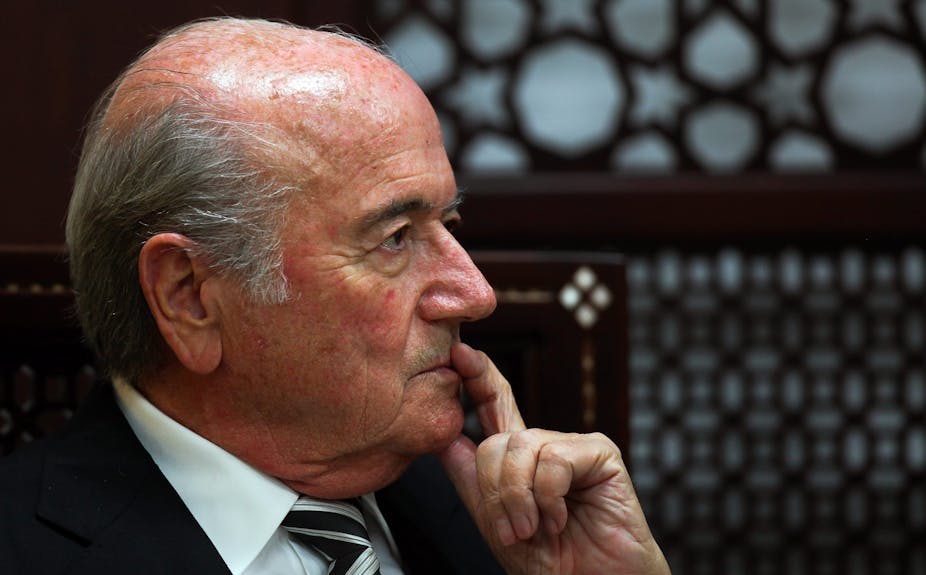Qatar did not win the right to host football’s World Cup in 2022 legitimately. That was impossible. Awarding the World Cup to Qatar was clearly not about passion for the game, nor about offering communities of players and spectators access to this once-in-a-lifetime opportunity.
Similarly, it was not about gay rights or gender equity or about integrating the right to host the event into a community, culture and infrastructure of prevailing football ability, event-organising capability and sporting passion. It was, unfortunately, about power and money.
According to allegations recently aired by the UK’s Sunday Times, FIFA executives had to be bribed in order to hand the World Cup to Qatar – assertions Qatari officials strongly deny.
The 2014 World Cup, which will kick off next week in Brazil, has been troubled by its own stadium construction delays and public outcry about the billions spent on a four-week event rather than on Brazil’s impoverished population. So, has FIFA’s legitimacy as football’s custodian reached its tipping point?
Three years ago, I wrote in The Conversation that at least some logic applied to awarding Russia the privilege of hosting the 2018 World Cup. Russia is a big country with lots of football stadiums in different cities, a relatively high-level domestic football competition and historical football prowess, as well as a (part of the) population that appreciates or even passionately follows and plays football.
However, and in my own words from 2011, the announcement that Qatar was going to organise the world’s biggest sporting show in 2022 not only stunned me, it made me sick to the stomach. Why I felt physically sick is that “we” – as in football fans from around the world – were openly insulted by FIFA’s “decision”.
By awarding the most prestigious and exciting (single) sporting event on the planet to Qatar, FIFA blatantly communicated that it did not care about the billions of common football fans.
In the three-and-a-half years since that famous announcement by FIFA president Sepp Blatter, the local Qatari organising committee has had to battle its own challenges. Suddenly, the temperatures during the Qatari summer – June-July, when the tournament is traditionally held – were not conducive to hosting the World Cup. It now appears inevitable the World Cup will be held in the northern winter.
Labour conditions of (imported) workers building the World Cup infrastructure were not up to commonly agreed human rights standards. An investigation by The Guardian revealed that 44 workers died in less than three months in 2013, about half of them from heart failure. Workers were forced to work in 50-degree heat and not able to quit because employers were allowed to withhold passports and salaries for several months.
The Guardian also found that sickness was endemic as the foreign army of cheap labour lived in overcrowded and unsanitary conditions. In response, the Qatari government has committed to instituting a series of reforms recommended in a report by international law firm DLA Piper.

Among the 300 or so sport executives and board members at a recent integrity in sport forum, the consensus was that money makes the professional sporting world go round. And if there is too much of a focus on “winning at all costs”, this attitude will lead to the degrading of the essence of sport.
Sport’s integrity is founded on “fair play”, respecting oneself and others in and outside the field of play. This very much extends responsibility to or, better yet, starts with strong sport leaders.
Leadership is most important at the summit of international sport, which includes FIFA. As the World Cup is globally relevant with mass media-exposed “reality television” stories and narratives, its influence on how our children will behave and compete on community sporting fields is quite large. Performance and behaviour of athletes and administrators are magnified and sometimes glorified by media outlets, driven more by ratings than by the quality of their programming.
Public and expert opinion is rapidly moving towards the view that FIFA should re-run the bidding process to host the 2022 World Cup. If FIFA is to remain slightly credible, it should acknowledge it got it all horribly wrong.
Making it right would also mean that knowledgeable outsiders, independent experts and assessors need to be brought into FIFA’s decision-making. Expert insights should be at the foundation of decision-making about awarding the World Cup (and other mega sporting events) to a host. This needs to be incorporated into FIFA’s governance protocols.
It might be time for the creation of a global sport-regulating agency: one that tackles some of the pressing matters that threaten sport’s integrity.
My concluding statement of three years ago still holds true. The FIFA Executive Committee should know by now that the beautiful game is not theirs, but that it belongs to you, me, our kids and our communities.

